Day 1 Session Notes–Healing Toxic Stress
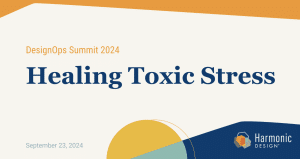
— To say that we as humans, and humans in design field have been through a lot would be an understatement, so let’s talk about it together
— Often workplaces tell us trauma and stress need to be healed individually
- Today want to talk about ways to heal together
- Resilience doesn’t come from tolerating and enduring suffering
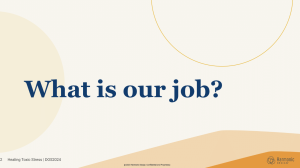
— So let’s start with a question. What is our job?
- As designops managers and people professionals
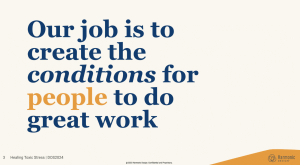
— Our purpose is that our job is for creating the conditions for people to create great work
- But we idealize the intellect too much
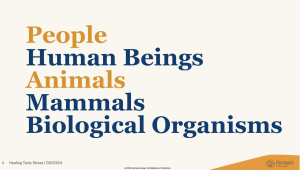
— We forget people are mammals and biological organisms
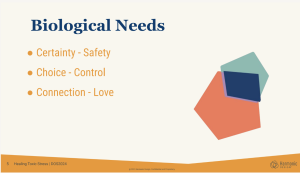
— Since we are not machines, but organisms, we need certain things and hard-wired into us
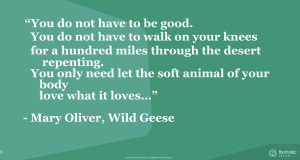
— As biological beings we are rather soft and fragile, and bodies get sick, broken and burned out, when our needs are not met
- You do not have to be good, but need to let body love what it loves
— Whole world witnessed this with Simone Biles suffering burnout at Tokyo Olympics, and stepping away for self-care
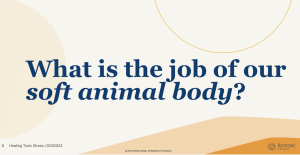
— We are biologically wired for one job, and what is that?
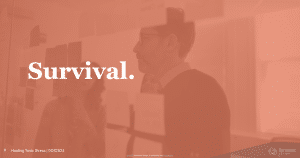
— That job is for survival, full-stop, and not deadline or next promotion
- Biological body are prioritized to choose survival over everything else
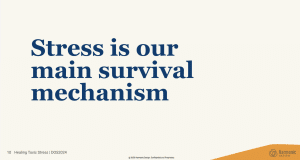
— Stress is hard-wired to ensure bodies survival
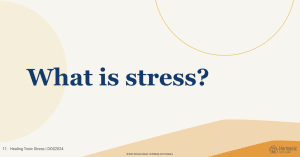
— But what is stress anyway?
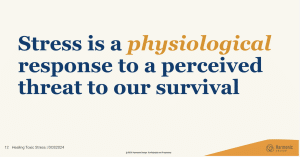
— Physiological response released into body and hearts beat faster and palms sweat to get body ready for perceived threat
- Since evolutionary stress response is millions of years old, you don’t know manager sending calendar invite with subject line of ‘Let’s Talk’ compared to a lion eating you
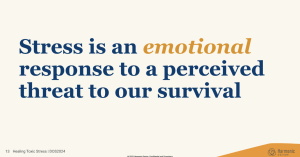
— Stress is also emotional response, and linked with fear
- If we feel stress on daily basis we feel fear on daily basis as well
— How much stress do you feel throughout the day? And how much fear throughout the day?
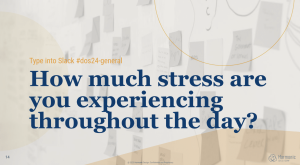
— Thread put in Slack channel to gauge your stress throughout the day
- Is it low, medium, high, toxic?
— I re-assessed my life to deal with stress in my own job
- Folks feel full range of stress levels in chat
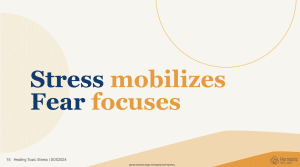
— Stress is nervous system going into mobilization, to get into action
— Fear focuses us on next immediate move to survive,
- Akin to tunnel vision
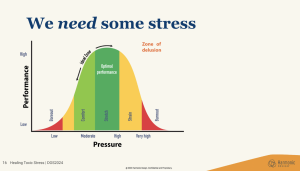
— Need some stress and fear to get into focused action, but there is an ideal amount of stress for optimal performance
- Not enough stress, we will feel bored and lethargic
- Too much stress, it’s hard to turn brain off
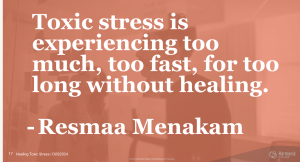
— Then there is toxic stress: high-level stress outside your ability to tolerate on a long-term basis
- Too much, too fast, too long, without healing
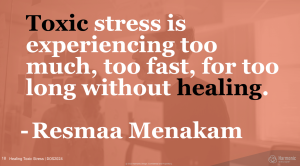
— Let’s talk about toxicity
- A thing that threatens very survival and animal bodies are meant to feel bursts of high-level threat, and then shake it off
— Biologically not wired to sustain high-levels of stress for long time
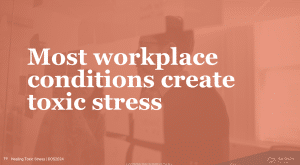
— Most workplace conditions create toxic stress and we expected to increase performance without end
- This expectation from workplaces are biologically impossible
— We’ve gotten so acclimated to toxic stress levels, that it feels like a baseline
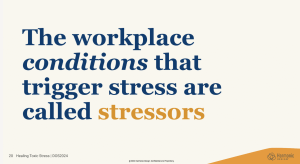
— Workplace conditions that trigger stress are called stressors
- Will walk through examples
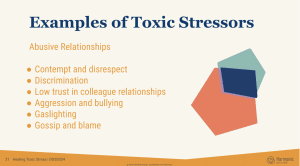
— Most common stressors are like an abusive relationship
- Experiencing contempt, disrespect, low-trust gossip and blame are all examples
— Not just a one-off event, but normal way of interacting with each other day in and out
— Use Slack thread so we can feel we are not alone in experiencing stressors
— I’ve experienced all of these
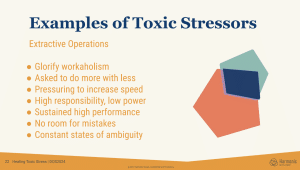
— There are also operational stressor,
- Mass layoffs as toxic stressor — as we wonder if we are next, along with grief and coworkers in relationship
- For next job, see rounds of layoffs a company has had
— Often asked about doing more with less, and increase speed without end
— Favorite is constant states of ambiguity and what is going on
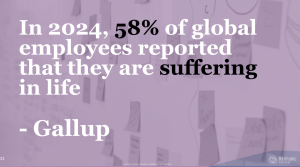
— In 2024, 58% employees reported suffering in life, and work was a big part of it
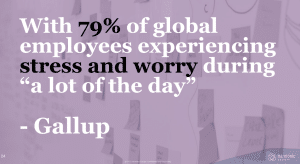
— 79% of employees experienced stress and worry during a lot of the day
- Statistic of thinking toxic stress over a long period of time turns into trauma and turn into PTSD
— 19% of workers experiencing trauma will develop PTSD, and workplaces are main sources for PTSD
- Normalize that most of us have been traumatized by conditions in workplaces with mass layoffs
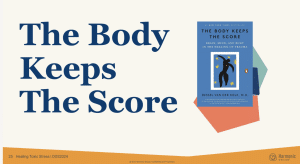
— While we might believe we have acclimated to stress, the body keeps the score
- Recommend Bassel Van Der Kolk’s book on this topic
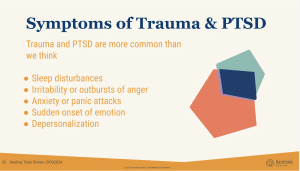
— Here’s how trauma shows up in body:
- Sleep disturbances and easiest to notices and unable to get asleep or fall asleep
- Irritability and outbursts of anger
- Angry conversations with your self
- Anxiety and panic attacks— lot of anxiety and panic attacks
— Sudden onset of emotion and extreme emotional response to situation
- Triggered if someone says something in certain tone of voice to trigger emotions
— Depersonalization: Feeling detached or separate from one’s own body and freeze response
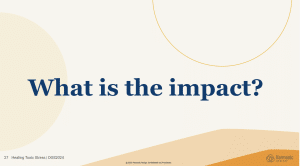
— So what is the impact on us individually, teams and organizations?
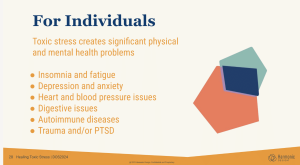
— Creates physical and mental health problems, even if we are used to high-stress
- Hormones, provide wear and tear at body
— Bursts of stress and then shaking it off, and will then have fatigue and digestive issues and stress-related
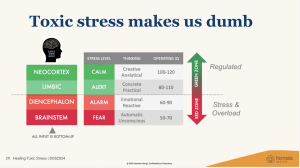
— Toxic stress also makes us dumb, and prevents us from doing great work and stress and operating IQ drops by half
- Inability to creative and focus on survival mode
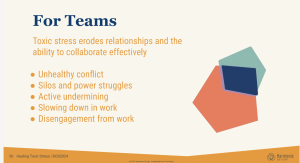
— Toxic stress also creates unhealthy relationship dynamics, active undermining of work, erodes relationships and ability to collaborate effectively
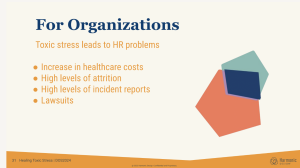
— Finally leads to healthcare costs, incident reports, and lawsuits
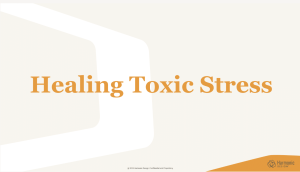
— Can create environments to heal from toxic stress and trauma and environments biologically as things much more resilient
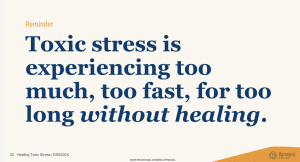
— Toxic stress is experiencing too much too fast, too long, without healing
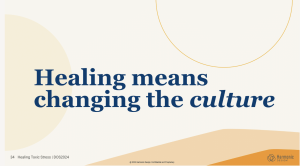
— Healing here means changing conditions and stressors so animal body can heal
- Workplace trauma can be healed in workplace, so harm can stop
- Resilience doesn’t come from enduring and tolerating suffering, but healing and changing conditions that cause it
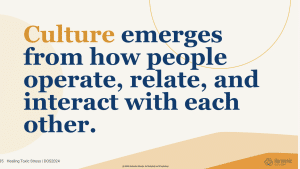
— Culture emerges from…
- Changing how we operate and relate to each other, as that is only thing in our control
- Change culture of your team, pod, or squad first
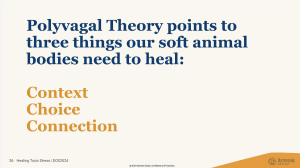
— To create conditions for healing, focus on three things to feel safe with soft animal bodies
- Context
- Choice
- Connection
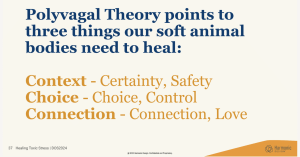
— This corresponds to biological needs
— Let’s talk about concrete conditions to change in team pod or squad
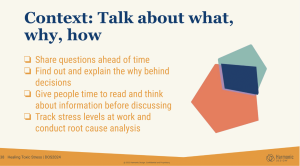
— Four Things you can do immediately
- Context: To talk about what, why, how of situation and making sure people are experiencing world in way that meets their expectations
- Ask why questions around decisions, and why certain ones were made
- Design teams I have worked with couldn’t explain logic behind certain decisions causing stress, so we worked to grasp the ‘why’
- If you are a hiring managers, share interview questions ahead of time to create a healthier interview process to take surprise out of conversation
- Ask why questions around decisions, and why certain ones were made
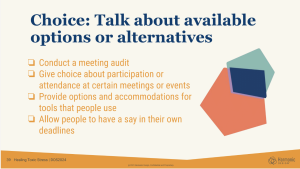
— Other suggestions include
- Choice: Need for choice and control and making sure people don’t feel trapped, stuck, or voiceless
- Ask questions like options available to me and alternatives available to me
- Conducting a meeting audit to make sure meetings are still needed and have clear agenda and are well run, and people needed to be there
- Gave more choice on meetings to attend
- The more choice they have the less stress
- Satisfying a need for connection, by feeling uniquely valued, and follow
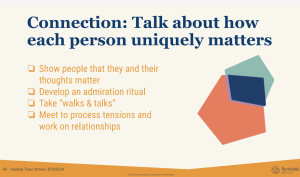
— Follow tips on messaging in Slack
- What do you admire about coworkers and people you work with and environment of healing?
- Rituals to celebrate people’s unique’s thoughts and contributions— admiration about your colleagues
- Admiration as antidote for contempt
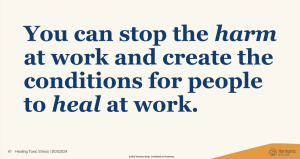
— Final thoughts, you don’t have to walk 100 miles through the desert to get relief
- You deserve a safe working environment and support through ups and downs of life
- Deserve every moment that your opinions and thoughts matter, and that you matter as a person
— If you are still stressed and suffering, and deserve to love soft, animal body and quit that job

— Thank you, you can connect with me LinkedIN
Q&A
- Value of balancing a job for income versus healing response?
- Having income from job will reduce stress levels, and think of stress as temporary and means to take care of self and family
- In what ways can it make sense to take job temporarily?
- Yes, but check-in with yourself as to what stress level is
- What would be most supportive thing for me?
- Less stress about income from part-time job, versus credit card
- What will be most supportive thing?
- How to advise people from applying to company, if a layoff event might happen again to time?
- View position as extremely temporary, and proceed with caution
- Go in with eyes open— and be real as possible as to what is going on
- You can’t exist in what you wish, but what is
- You can project hopes, but address underlying reality
- Noteworthy examples of sounding alarm in workplaces with toxic stress?
- Talking to other folks about how you are feeling and speak to lived experience, and let people know you can’t get to sleep
- Lot of emotional reactions to day-ot-day things and share experiences with each other, and don’t go to executives with claims of toxic organization
- Find folk internally and make a shift in squad and make it better for folks

